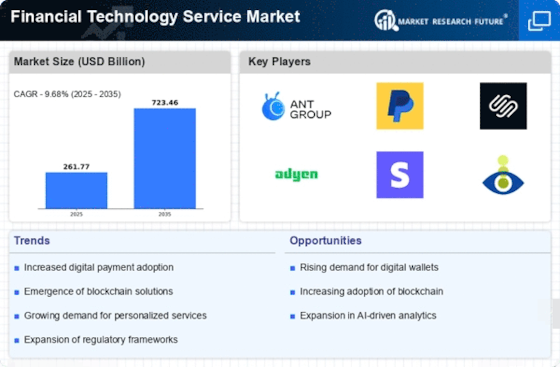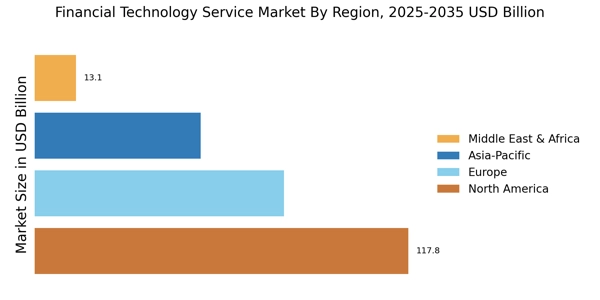Expansion of Fintech Startups
The Financial Technology Service Market is witnessing a remarkable proliferation of fintech startups, which are reshaping the landscape of financial services. These startups are leveraging technology to offer innovative solutions that challenge traditional banking models. Recent statistics indicate that the number of fintech startups has increased significantly, with thousands emerging in various niches such as lending, payments, and investment management. This influx of new entrants fosters competition, driving established financial institutions to innovate and collaborate with these agile companies. As a result, the financial technology service market is likely to see enhanced product offerings and improved customer experiences, as startups introduce disruptive technologies that cater to evolving consumer needs.
Growing Focus on Cybersecurity
In the Financial Technology Service Market, the emphasis on cybersecurity has intensified as digital transactions proliferate. With the rise in online banking and mobile payment solutions, the potential for cyber threats has escalated, prompting financial technology service providers to prioritize robust security measures. Data suggests that cybercrime costs the financial sector billions annually, underscoring the necessity for advanced cybersecurity protocols. As a response, many fintech companies are investing heavily in security technologies, including encryption, biometric authentication, and fraud detection systems. This focus on cybersecurity not only protects consumers but also enhances trust in financial technology services, which is crucial for sustaining growth in a competitive market.
Integration of Blockchain Technology
The Financial Technology Service Market is increasingly integrating blockchain technology to enhance transparency and efficiency in transactions. Blockchain offers a decentralized ledger system that can significantly reduce transaction times and costs, making it an attractive option for various financial services. Recent analyses indicate that the adoption of blockchain in financial services could lead to savings of billions in operational costs over the next few years. Furthermore, the technology's inherent security features may bolster consumer confidence in digital transactions. As financial technology service providers explore blockchain applications, they are likely to develop innovative solutions that streamline processes, thereby positioning themselves favorably in a competitive landscape.
Increased Demand for Contactless Payments
The Financial Technology Service Market is experiencing a notable surge in demand for contactless payment solutions. As consumers increasingly prefer the convenience and speed of contactless transactions, financial technology services are adapting to meet this need. According to recent data, contactless payments are projected to account for a significant portion of all transactions, with estimates suggesting that they could represent over 30% of total payment volume by 2026. This shift is driven by consumer preferences for seamless experiences, particularly in retail and e-commerce sectors. Financial technology service providers are thus investing in innovative solutions to enhance user experience and security, ensuring that they remain competitive in a rapidly evolving market.
Regulatory Support for Fintech Innovation
The Financial Technology Service Market is benefiting from a favorable regulatory environment that encourages innovation. Governments and regulatory bodies are increasingly recognizing the potential of fintech to enhance financial inclusion and improve service delivery. Recent initiatives have been introduced to create regulatory sandboxes, allowing fintech companies to test new products in a controlled environment. This supportive framework is likely to accelerate the development and deployment of innovative financial technology services. As regulations evolve to accommodate new business models, the industry may witness a surge in investment and collaboration between traditional financial institutions and fintech firms, fostering a more dynamic and competitive market.

















